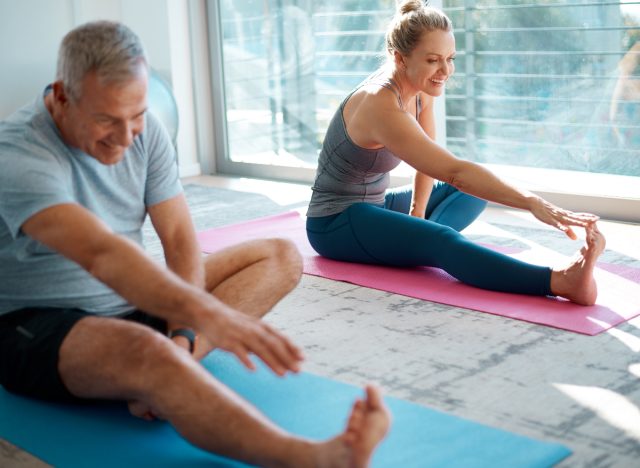Why Is ‘Deloading’ in a Fitness Routine Important To Get the Best Results?

Whether your goal is to lose weight, build muscle, or maintain a sculpted, toned physique, making the most of your gym time is key. However, rest and recovery days are just as important as you work your way toward noticeable results. That’s why we spoke with Cormac Murphy, CPT, C4 Energy Brand Ambassador, who breaks down everything you need to know about “deloading,” a crucial (yet sometimes overlooked) part of your fitness routine.
Keep reading to learn more, and when you’re finished, don’t miss Bodyweight Exercises vs. Lifting Weights: Which Is More Effective for Building Muscle?.
What is deloading?

Deloading is when you reduce the intensity of your training, volume, or both, after performing a stretch of intense workouts. “The purpose of deloading is to allow the body to recover, adapt, and super compensate from the stressors of training,” Murphy tells us.
All in all, you really shouldn’t skip deloading, as it’s an integral part of any effective workout program. “It allows the body to progress safely while minimizing the risk of injuries and burnout,” Murphy adds. “By incorporating deload periods into a workout routine, individuals can optimize their training results and achieve long-term success.”
Why is deloading so important?
1. It promotes recovery.

As previously stressed, your body needs ample recovery time so it can rest and repair itself. That’s where deloading comes into play.
“Deloading provides a break from intense training, allowing the body to recover from accumulated fatigue,” Murphy tells us. “This helps prevent overtraining, reduces the risk of injury, and promotes overall well-being.”
2. It decreases your risk of plateauing.
Plateauing can be incredibly frustrating—especially when you think you’re doing everything right. Deloading reduces your chances of hitting a plateau.
“Continuous high-intensity training can lead to a plateau in performance or progress,” Murphy explains. “Deloading interrupts this cycle by giving the body a chance to recover fully, potentially leading to greater gains in strength, muscle mass, or endurance once training resumes.”
3. It helps you avoid burning out.
Doing too much of anything is a surefire way to cause mental and physical exhaustion. Working out is no exception to the rule.
“Deloading helps maintain motivation and enthusiasm for training by preventing burnout and keeping workouts enjoyable,” Murphy points out.
4. It addresses weaknesses and imbalances.
Deloading gives you the opportunity to focus on addressing any imbalances, weaknesses, or mobility issues that can result from working out intensely.
“This can involve incorporating corrective exercises, mobility work, or lighter, higher-repetition training,” says Murphy.
5. It’s sustainable and promotes progress in the long term.

By including deload periods into your training regimen, it’s much easier to progress over time. “It allows for more sustainable training practices that prioritize overall health and longevity,” Murphy notes.
In addition, it’s sustainable. “Deloading is essential for long-term training sustainability,” Murphy adds. “By incorporating regular deloads into a workout routine, individuals can maintain consistency without risking burnout or overtraining-related setbacks.”
6. It helps prevent injury.
Deloading lowers your chances of suffering from overuse injuries, which are commonly linked to consecutive high-intensity training. “It gives joints, tendons, and ligaments a chance to recover and adapt, reducing the likelihood of strains, sprains, and other injuries,” explains Murphy.









